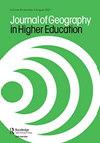Spatialising Sport Management
IF 1
4区 教育学
Q2 EDUCATION & EDUCATIONAL RESEARCH
引用次数: 2
Abstract
ABSTRACT Sport and geography may be considered allied and complementary disciplines. They share, variously, interests in ideological and physical spaces, political and socio-cultural processes of space- and place-making, historical dis-/continuities, individual and collective identity formation, demography and topographies and representational practices therein. Sports geography modules may, for example, be taught independently within Geography, Sport Management/Studies/Science, Urban Studies, Development or Liberal Arts programmes, or form a bridge across shared degree/honours courses as a way of attracting an interdisciplinary audience of students. Regardless of institutional “home”, sports geography, affords a rich context for engaging students with critical contemporary issues, global-local analysis, and socio-cultural complexities and social justice concerns. We argue in this paper for a more pronounced place for sports geography – specifically, critical spatial studies – within Sports Management. We draw on our professional and personal experiences teaching sport and geography related courses. We contextualise the teaching of sports geography against wider Higher Education forces. Next we provide pedagogical illustrations of the benefits of a sports geography focus. We offer some recommendations and reflections. Ultimately, we advocate for improved collaboration between Sports Management and Geography fields, and call for continued scholarly and pedagogical symbiosis and play that might produce new and creative interdisciplinary inquiry.体育管理空间化
摘要体育和地理可以被认为是相互关联和互补的学科。他们在意识形态和物理空间、空间和场所形成的政治和社会文化过程、历史差异/连续性、个人和集体身份形成、人口学和地形以及其中的代表性实践等方面有着不同的兴趣。例如,体育地理模块可以在地理、体育管理/研究/科学、城市研究、发展或文科课程中独立教授,也可以在共享学位/荣誉课程之间架起桥梁,吸引跨学科的学生。无论机构的“家”是什么,体育地理都为学生参与当代关键问题、全球地方分析、社会文化复杂性和社会正义问题提供了丰富的背景。在这篇论文中,我们认为体育地理学——特别是批判性空间研究——在体育管理中占有更重要的地位。我们利用我们在体育和地理相关课程教学方面的专业和个人经验。我们将体育地理教学与更广泛的高等教育力量相结合。接下来,我们提供体育地理重点的好处的教学说明。我们提出了一些建议和思考。最终,我们主张改善体育管理和地理领域之间的合作,并呼吁持续的学术和教学共生和游戏,这可能会产生新的创造性跨学科研究。
本文章由计算机程序翻译,如有差异,请以英文原文为准。
求助全文
约1分钟内获得全文
求助全文
来源期刊

Journal of Geography in Higher Education
Multiple-
CiteScore
5.80
自引率
9.50%
发文量
29
期刊介绍:
The Journal of Geography in Higher Education ( JGHE) was founded upon the conviction that the development of learning and teaching was vitally important to higher education. It is committed to promote, enhance and share geography learning and teaching in all institutions of higher education throughout the world, and provides a forum for geographers and others, regardless of their specialisms, to discuss common educational interests, to present the results of educational research, and to advocate new ideas.
 求助内容:
求助内容: 应助结果提醒方式:
应助结果提醒方式:


